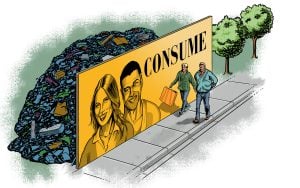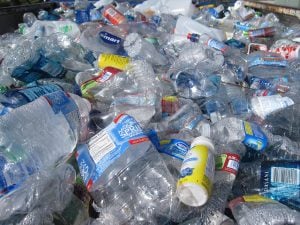
Environment
Bioplastics: Don’t let the label fool you
Doing your part as an eco-conscious consumer doesn’t end once you buy a bioplastic product
- 1626 words
- 7 minutes
Environment
Myra Hird, a sociology professor at the School of Environmental Studies at Queen’s University in Kingston, Ont., discusses why recycling isn’t a perfect solution

Myra Hird doesn’t see plastic waste as merely a problem to be solved by scientists and engineers. In this exclusive Q&A interview, the sociology professor at the School of Environmental Studies at Queen’s University in Kingston, Ont., talks about the need for Canadians to totally rethink our plastic waste — and why recycling isn’t a perfect solution.
I had just finished writing a book on bacteria, when I was contacted by Dr. Kerry Rowe, a civil engineer at Queen’s University, and a world-leading expert in landfill engineering. He asked if I would like to study waste issues from a social scientific perspective, and collaborate with him. I hadn’t, myself, thought of studying waste issues initially. But now that I’m in it, I’m very committed to waste issues as my research. What interests me is that waste is not a technological problem. I see waste as a sort of a prism through which we can see big world issues. And the foremost issue for me is in social justice. I do research in Arctic communities in Canada, where waste is handled very differently than in southern communities. For instance, I’m just finishing a book right now, which really argues that you can’t understand waste issues in Canada’s Arctic without understanding settler colonialism. So, for me, waste is a great way of getting at big issues that people don’t normally connect with waste.
I’ll give you an example of why waste is a social justice issue. There is a call to amend the Basel Convention [an international treaty on the exportation of hazardous waste] that’s being considered right now, and a number of countries have already signed off on it. This amendment is to ban the export of plastics — and our current government is not signing on. One of the reasons given is that plastics recycling provides employment opportunities in developing countries. What that actually means is that there are children, pregnant women, women of reproductive age, and very impoverished people eking a better life out of picking through our garbage, and the garbage of other countries — to then reprocess it using chemicals. So, when Canada says to the world that we won’t sign on to this ban on plastic export, what we’re actually saying is that we’re okay with exporting our plastics to countries that have labour practices that would be absolutely illegal in Canada. The front line of the recycling companies in developing countries are children and women. I don’t think Canadians will be happy to think that our international waste footprint supports child labour in developing countries under extremely hazardous working conditions.
Generally, what we’re seeing in Canada, and other countries around the world, is a sort of waking up of people that have been told, for a generation now, that recycling is this really great thing. This is far from the case. I think the time is long overdue for Canadians to have really informed discussions about what we’re actually doing with our waste. There are recent examples where Canadian waste has found its way to other countries, like the Philippines, and it has become an international embarrassment. I think that has been a big shock for many Canadians. I’ve been contacted by so many people saying: “how do we end up having waste in the Philippines?” I think the story of how those things happen is really important, because it really helps Canadians to understand what’s really going on — not what we’re told has been going on, or not what we assume is going on, but what is actually happening.
We recently learned, and this is a very general statistic, that only nine per cent of plastics are being recycled in Canada. I think many Canadians are shocked by that, because they are recycling all of these plastics that they think are being recycled, but that are impacting landfills. Firstly, things are only recycled if there’s a market for them, because recycling as waste management is generally privatized in Canada. Recycling companies are only going to recycle if there’s a profit to be made. Something that would be recycled in January, might be in landfills by December. Also, the recycled product is usually a degraded product, because the recycling process itself degrades the material, which means that that material is only going to get one more use before it’s landfilled — recycling doesn’t keep everything in circulation indefinitely. Thirdly, recycling creates waste. Recycling processes typically use chemicals, which create often more toxic forms of waste. And that waste needs to be landfilled in hazardous waste landfills. So, recycling itself is not good for the environment, because it creates more waste.
There’s also correlational evidence that shows that when people see that there is a recycling program in place, they actually increase their consumption — because they think that the packaging, or whatever it is that they’re consuming, will be recycled. And increasing consumption is the problem.
There’s the problem we have in the present, and then there’s everything we’ve inherited from the past — all the plastic, all these materials that we’ve already consumed. Because even if we somehow magically stopped creating waste today, we’d still have millions of tonnes of waste that we would have to deal with. I like to talk about waste as a downstream issue and an upstream issue. If we look at downstream solutions — that includes things like technologies, getting people to recycle better and all of that —that’s not going to solve our waste issue. What we need to do is think more upstream, which is about getting governments to hold industry far more accountable for the production of goods and the production of waste. It’s getting people to think about reducing or reusing. Reusing is not the same thing as recycling — recycling requires reprocessing, because recycling makes something into something different. Reusing means we keep [the original item] in circulation longer — we’re not consuming that thing again, we’re not going out and buying a new thing. We need to change our thinking. Ordinary citizens are fully capable of consuming far less, and drastically increasing reuse practices. Culture, societies, countries, people are certainly able to change, but we need governments working much more clearly on making upstream changes with industry.
Interestingly enough, recycling has become sort of the way in which Canadians express their commitment to the environment. Much more so than air travel or buying electric cars, or whatever — people express their commitment to the environment by recycling. Study after study shows that people really survey themselves, and they survey their family members, and they survey their neighbours, and they get emotionally invested in it. Because it’s a way that people feel that they can participate in doing something positive for the environment. It’s just that that’s misdirected. If people understand how misdirected it is to focus on recycling, Canadians should be pretty angry that that’s the story they’ve been given. And I think Canadians should demand to know the fuller story. And then they should demand the politicians do something about the bigger story. I always say to my students, you know, the devil’s in the details. So, when industry or government makes a claim, you want to ask about the details of that claim. I think Canadians deserve more honest information. And I think that Canadians are very capable of asking the right questions.

Environment
Doing your part as an eco-conscious consumer doesn’t end once you buy a bioplastic product

Environment
Canada leads the developed world in per capita production of garbage. What’s behind our nation’s wasteful ways?

Science & Tech
Environmental entrepreneur Miranda Wang turns to science to seek profitable solutions to the problem of what to do with our mountains of plastic waste

Environment
In a declaration released in advance of this weekend’s G7 summit, more than 40 environmental groups have challenged Canada to achieve zero plastic waste by 2025

Environment
Ten years after the release of her seminal book Sea Sick, Alanna Mitchell again plumbs the depths of the latest research on the health of the world’s oceans — and comes up gasping

Environment
Before joining Ocean Bridge, I was completely unaware of the extent of the problem of single-use plastic consumerism